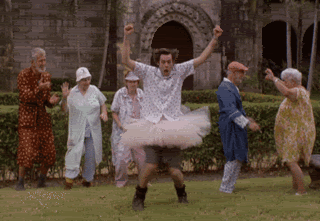Last summer I finished my second novel,
Cheesus Was Here, about a girl determined to prove miracles aren't real when her small Texas town is overrun by ridiculous religious signs. I sent it to a friend and waited expectantly. I just knew my friend was going to love it and tell me how awesome I am and how fabulous my book is because, unlike my last disaster of a novel, this book was THE ONE.
She ripped the story to shreds. I cried. Then I picked myself up and began revising because she was right, the novel was a first draft and had sooooooooooo many flaws it's embarrassing. It's HARD telling a friend their story is a mess. I've been there. Thank God, my friend had the courage to tell me the truth.
I revised feverishly, impatient to get my book out the door and into the hands of agents. I finished a draft, had several CPs and Betas look it over and promptly sent a handful of queries out. I also entered a contest called Pitch Wars.
I knew in my heart, even if I wouldn't admit it out loud, that my book wasn't quite ready for agents. I was positive I'd get into Pitch Wars and a mentor would help me polish my poor little MS into literary gold. I carefully stalked and selected my mentor choices. But on reveal day, I didn't make the cut. There was some more crying. It's a theme.
Despite not getting picked, Pitch Wars was amazing. I made good friends, somehow talked one of the mentors I'd pitched into becoming my CP and had a lot of fun. I regret nothing. I also decided contests were fun so what the heck, might as well try a few more. I entered a Twitter pitch contest called PitMad and got several requests. After that I was hooked so I entered Pitch Slam, made the finalists list and picked up two more requests. Never one to quit I entered two separate Secret Agent contests, won both and got two more full requests
Meanwhile, I flung queries out into the world, got some personalized rejections and
*gasp* full and partial requests. I got quite a lot of full and partial
requests. THIS WAS IT! One of these agents was going to fall in love
with my novel and sign me right away! (Do you sense a trend?)
The rejections began rolling in. I could handle query rejections, but full and partial rejections were harder to shrug off. Especially when the agents were all saying the same thing. I began to despair. No one was going to love my novel and I'd blown my chance by querying too soon.
In early November, one of the agents who'd requested a full through PitMad sent me a Revise & Resub request. I leaped on it. This was my chance to revise the novel and address all those issues I'd missed the first time. Plus, bonus, she had some great recommendations on how to fix the novel. YAY! I promptly sent every single agent who had my full or partial an email saying I was revising the MS at an agent's request and would they like to see the new version when it was ready. All but one said yes. I now had 16 agents waiting on my novel. Ohhhhhh the heady excitement of it all.
I revised. Rewrote. Sent to beta readers. Incorporated feedback. Was lucky enough to find a few new beta readers and CPs and fixed more things. I revised that manuscript so many times there was red ink dripping from my laptop. I murdered a lot of darlings.
Finally, the manuscript was done. Now the agents would love it. Now I would get all the offers and my shiny new agent and I would dance off into the sunset together. In early February, I sent my revised manuscript to the 16 agents waiting for it and queried a few more.
The very next day I received my first rejection on the revised manuscript. DESPAIR! No one was going to love my novel. No one. Okay, my CPs loved it. And every rejection had really nice things to say. Sometimes bafflingly nice. But maybe my novel wasn't good enough after all.
The rejections trickled in. Four weeks later I was getting almost used to them, but still cringed every time I opened an email from an agent. When another email hit my inbox I prepared for the inevitable "love your writing but this just isn't for me" note. Instead, Agent A wanted to set up a call for the following Monday. OMG! This was IT! THE CALL! I tried to remain calm. It could be another R&R. But I just knew this was it.
On Monday, I called at the appointed time. Agent A had written down our appointment for the wrong day. Doh! We rescheduled for later that afternoon. That sounds horrible but it was kind of nice because by the time our second call time rolled around, I no longer felt like throwing up. It's the little things in life that get you through.
Agent A began by saying how much he enjoyed my MS and a few changes he'd like to see and then said the magic words: "I'd like to offer you representation." At this point 11 agents still had a full or partial. I immediately emailed them all, giving a deadline of two weeks to respond.
A few stepped aside right away. But, several more let me know they'd get back to me. A week later I got a second offer. Agent B called Sunday evening. I took the call sitting in my garage on the bare concrete so that the sound of my kids trying to murder each other wouldn't interrupt our conversation. (My kids are mortal enemies, true story.)
Agent B and I talked for an hour and it was amazing. My butt went numb thanks to the concrete and I didn't even care. We really connected. She was one of those dream agents I'd queried but never expected to actually work with.
I was so giddy after our call I danced around like an idiot, emailed my closest CPs and then stared at the calendar moodily. I knew, KNEW deep down, that I was going to sign with Agent B and waiting an entire week seemed like horrible torture.
I emailed Agent B the next day and asked her advice. She recommended letting the other agents know that we'd really hit it off and I was withdrawing my submission if they hadn't read the MS yet. If they had, I was willing to chat if they wanted. That way if an agent had already read the full MS and wanted to make an offer, I wasn't pulling the rug out from under them, but I also wasn't wasting anyone's time who hadn't read the MS yet.
All of the other agents stepped aside after that email, some really grateful that I'd been upfront about wanting to sign with Agent B. Agents are busy people and they read A LOT of requested material. Wasting their time when you've already made a decision is not terribly nice, even if you're just trying to be polite.
The next day was the most surreal of my life. For the first time I was happy every time an agent emailed to say they were stepping aside. I was HAPPY at being rejected. Every single email was one closer to letting me sign with Agent B. All of the agents were amazingly nice and wonderful, I really hated disappointing several of them and especially the agent who'd originally requested the R&R. But, as I said, I knew in my heart that Agent B was the perfect fit for me, Cheesus, and my future projects.
On Wednesday, March 25, just over six months after my first query went out, I signed with Mandy Hubbard of the D4EO agency!!!!!! I love that Mandy is a writer and an agent. Plus if you follow her Twitter feed you'll see that she's essentially made of awesome. And now I get to dance off into the sunset at last!
The Stats
Queries: 74
Full & Partial Requests: 27
Offers of Rep: 2
Agents who stepped aside: 9
Both
of my offers came from slush pile submissions, though several fulls and
partials were from contests.
The Oscar Speech
A few friends went above & beyond, reading the book multiple times and holding my hand through late-night angst sessions. Special thanks to Kimberly for inspiring me, distracting me & offering great advice. To Kate for being a kick-ass editor and reading the book so many times she can probably quote the entire thing by now. To Erica, for telling me that first draft had promise but needed a hell of a lot of work. To Addie, Jake, Rachel & Heidi for their amazing CP abilities. To the writers in my YANA critique group for line edits, support and all around awesomeness. To everyone who helped with my query during WriteOnCon, to every Twitter friend who cheered me along the way, to every writer who inspired me by posting their own agent stories: Thank You! And finally, thanks to my family for being excited for me, even when they're not sure why. I am blessed with amazing people in my life.

























































